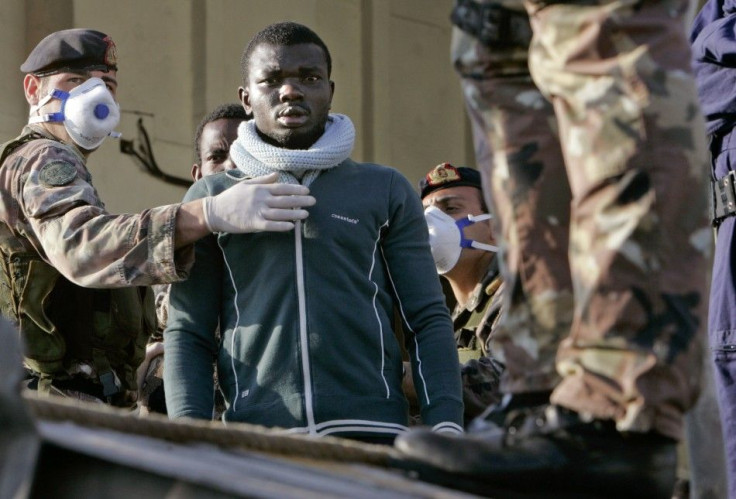Italy Tries to Cope With Rising Tide of Immigration from Africa

The death of Moammar Gadhafi on Thursday and the ongoing Arab Spring protests in North Africa and the Middle East have been heralded around the world as a triumph of democracy. But the violence, war and political uncertainty that followed it in many countries has given rise to a new challenge.
Although African immigration is a problem across all of Europe, Italy and other Mediterranean countries are the most affected by this mass movement of people. Because of a 2003 European Union law called the Dublin II Regulation, the first European country an asylum seeker enters is solely responsible for the migrant's protection and application. This places a disproportionate burden on countries like Italy, where hundreds of migrants fleeing Libya and Tunisia at the start of the revolution landed daily.
In 2006, the Dublin II Regulation meant that Spain received at about 636,000 migrants, representing almost half of the Eurozone total and 100,000 people more than the number of those arriving in Germany, France, and Britain combined, according to the Council on Foreign Relations.
This year in Italy, the swell of sub-Saharan Africans entering the country -- many of them former migrant workers escaping violence in Libya, some refugees from the Tunisian revolt, others fleeing the famine in Somalia -- became so great that there were riots on the island of Lampedusa, where thousands of migrants waited months to be processed by an apathetic government.
When I was living in Italy, I met a Nigerian immigrant in the town of Pistoia -- one of many small, medieval cities in Tuscany, most of which have very small migrant populations. (The city of Prato, where one third of the population is Chinese immigrants, is a notable exception.)
Most the immigrants in Italy, as with most countries around the world, head to big cities. About 15 percent of the people in Milan were foreign-born immigrants in 2009, according to the Italian National Institute of Statistics; while in Rome, about 10 percent of the population is non-Italian. The Nigerian, named Eddy went to Pistoia instead.
There were other Nigerians there, most living and working together on the street, as he said, and selling the same packets of tissues, gum and cigarettes.
Eddy never said if he was illegal. I didn't ask at the time, and I wish now that I had. If I were to speculate, I would guess that Eddy was not legal. In general, the majority of people seeking asylum in Italy get rejected, forcing them either to await an eventual deportation or to enter Europe illegally.
In Europe, if you don't have documents, you are nothing - you are an empty vessel, a Sierra Leonean immigrant named Michael told the BBC. But the hope is that it's better than it was at home.
During our conversations, which took place in public squares and at cafés' outdoor tables, Eddy was always on guard. Like I had seen in Florence, Rome and Paris, African immigrants and informal (i.e. illegal) street vendors are targets for cops. Seeing a group of men carrying bags of merchandise suddenly sprinting down a street being chased by the police was not an unusual sight.
Additionally, Silvio Berlusconi's government has tried to crack down on illegal immigration, starting with those already in Italy. In 2009, Italian legislators made entering or staying in the country illegally a criminal act punishable by a fine of $7,000-$14,000. Moreover, any landlord caught renting to an illegal immigrant faces up to three years in prison.
Berlusconi even said that these measures were so that a multi-ethnic Italy couldn't happen.
When I met Eddy, he was in his early twenties with tightly braided hair. And while we chatted about where he came from, how he arrived in Italy, he only wanted to talk rap music.
Music is my middle name, Eddy said.
His favorite types of music are rap and reggae, and his favorite artist is the late Tupac Shakur, because 2-Pac raps about doing what it takes to survive, not nonsense like gold and girls. 2-Pac speaks to Eddy because 2-Pac speaks for Eddy. For the same reason his likes reggae, it is music that talks about the struggle, about doing what it takes to survive, even if that includes selling drugs.
After just a year in Pistoia, he was nearly fluent in Italian, and he found it hard to understand why I wasn't completely fluent after nearly three years of study. English was his native language and he also spoke an elementary amount of French.
Eddy was not leech, nor a violent criminal nor thief, like many Italian politicians and citizens claim. What he was doing was against the law, though.
With Italy and other European countries unable to deal with the increasing immigrant burden, there will be more immigrants who choose Eddy's route, rather than waiting in welcome centers to be processed for months and months.
In the time I knew him, Eddy never complained. Yes, life was hard, but going to Europe was not a choice that he regretted. Berlusconi, the police and some of the affluent Tuscans in Pistoia may not have wanted him there, but Eddy would stay, no matter what.
© Copyright IBTimes 2025. All rights reserved.




















